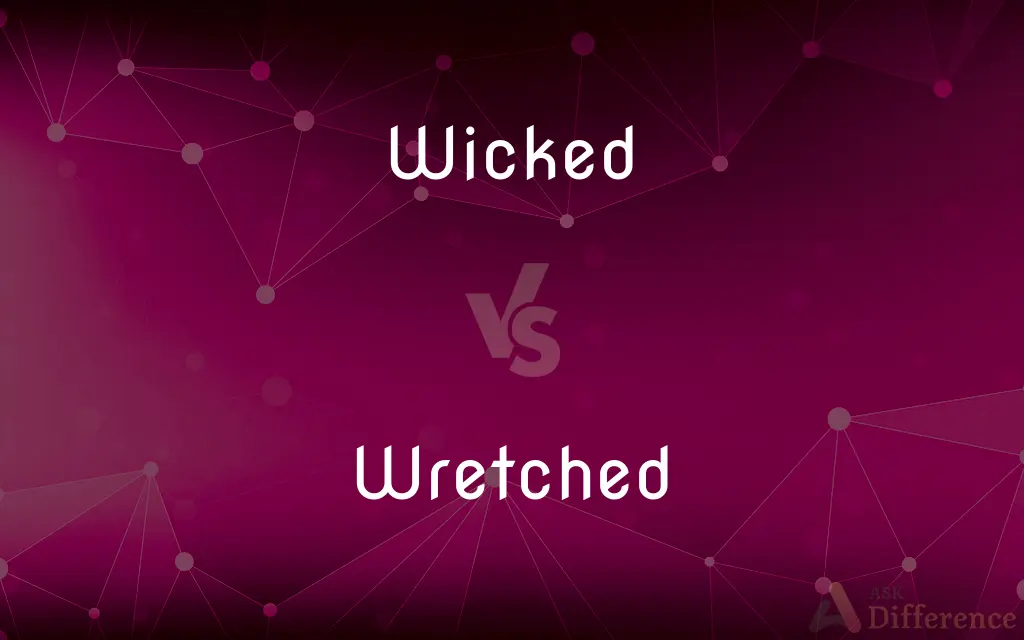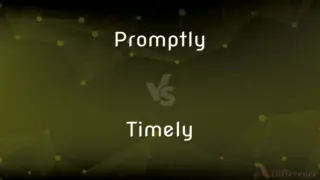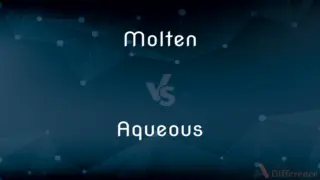Wicked vs. Wretched — What's the Difference?
By Maham Liaqat & Urooj Arif — Updated on May 6, 2024
Wicked often describes immoral or malevolent behavior, while wretched refers to a state of extreme distress or misfortune.

Difference Between Wicked and Wretched
Table of Contents
ADVERTISEMENT
Key Differences
Wicked primarily refers to actions or behaviors that are morally wrong or evil. It often carries a connotation of intentional malice or harmful intentions. On the other hand, wretched describes conditions or situations that are extremely unsatisfactory, miserable, or deplorable, often invoking sympathy rather than condemnation.
When used to describe a person, wicked suggests someone who indulges in or enjoys malevolent activities. In contrast, when wretched is used to describe a person, it highlights their condition of profound misery or destitution, focusing on their suffering rather than their moral character.
In literature, wicked characters are often antagonists, crafted to embody vices and immoral deeds. Meanwhile, wretched characters are typically portrayed as victims of circumstance, whose plight elicits empathy from the reader.
The use of wicked in everyday language can sometimes be light-hearted or playful, indicating something extremely good or impressive, such as in the phrase "wicked smart." Conversely, wretched does not have a positive connotation and is almost exclusively used to express extreme adversity or unhappiness.
In religious or spiritual contexts, wicked is used to denote sinfulness and moral deviation from divine or ethical laws. Wretched, however, can describe a spiritual lowliness or unworthiness, often used in theological discussions about human frailty and the need for divine mercy or redemption.
ADVERTISEMENT
Comparison Chart
Primary Meaning
Morally wrong or evil
Extremely miserable or unhappy
Usage in Person
Implies malevolence
Highlights suffering or pity
Literary Role
Often an antagonist
Usually a sympathetic victim
Alternate Use
Can be positive in slang (e.g., "wicked smart")
Always negative
Spiritual Connotation
Sinfulness, moral deviation
Lowliness, need for redemption
Compare with Definitions
Wicked
Morally wrong or evil.
The villain’s plan was wicked beyond belief.
Wretched
In a very unhappy or unfortunate state.
After losing everything, he was left in a wretched state.
Wicked
Intended to or capable of harming someone or something.
He gave a wicked laugh as the chaos unfolded.
Wretched
Deserving or inciting pity.
Her wretched appearance pulled at my heartstrings.
Wicked
Excellent; wonderful (informal usage).
She plays a wicked game of tennis.
Wretched
Of poor quality; very bad.
The food at the cheap diner was wretched.
Wicked
Playfully mischievous.
His wicked sense of humor always lightened the mood.
Wretched
Very ill or weak.
He looked wretched after the lengthy illness.
Wicked
Severe or fierce.
The storm brought wicked winds and rain.
Wretched
Used to express anger or annoyance.
I can’t believe you did that, you wretched boy!
Wicked
Evil or immoral
"this wicked man Hitler, the repository and embodiment of many forms of soul-destroying hatred" (Winston S. Churchill).
Wretched
In a deplorable state of distress or misfortune; miserable
"the wretched prisoners huddling in the stinking cages" (George Orwell).
Wicked
Playfully malicious or mischievous
A wicked prank.
A critic's wicked wit.
Wretched
Characterized by or attended with misery or woe
A wretched life.
Wicked
Severe and distressing
A wicked cough.
A wicked gash.
Wicked driving conditions.
Wretched
Of a poor or mean character; dismal
A wretched building.
Wicked
Highly offensive; obnoxious
A wicked stench.
Wretched
Contemptible; despicable
Wretched treatment of the patients.
Wicked
(Slang) Strikingly good, effective, or skillful
A wicked curve ball.
A wicked imitation.
Wretched
Of very inferior quality
Wretched prose.
Wicked
Used as an intensive
"a ... body suit, which she describes as wicked comfortable" (Nathan Cobb).
Wretched
Characterized by or feeling deep affliction or distress; very miserable.
I felt wretched after my wife died.
Wicked
Evil or mischievous by nature.
Genuine cowards follow wicked people and cannot reliably sustain any virtue.
Wretched
Of an inferior or unworthy nature or social status; contemptible, lowly.
The street was full of wretched beggars dressed in rags.
Wicked
(slang) Excellent; awesome; masterful.
That was a wicked guitar solo, bro!
Wretched
Of an insignificant, mean, or poor nature; miserable, paltry, worthless.
Wicked
Having a wick.
A two-wicked lamp
Wretched
Of a person, etc.: behaving in a manner deserving contempt; base, despicable, wicked.
Wicked
Active; brisk.
Wretched
Of weather: causing much discomfort; very unpleasant; miserable.
Wicked
Infested with maggots.
Wretched
(informal) Used to express annoyance towards or dislike of someone or something: bloody, damned.
Will you please stop playing that wretched trombone!
Wicked
Alternative form of wick, as applying to inanimate objects only.
Wretched
Very miserable; sunk in, or accompanied by, deep affliction or distress, as from want, anxiety, or grief; calamitous; woeful; very afflicting.
O cruel! Death! to those you are more kindThan to the wretched mortals left behind.
Wicked
Very, extremely.
The band we went to see the other night was wicked loud!
Wretched
Worthless; paltry; very poor or mean; miserable; as, a wretched poem; a wretched cabin.
Wicked
Simple past tense and past participle of wick
Wretched
Hatefully contemptible; despicable; wicked.
Nero reigned after this Claudius, of all men wretchedest, ready to all manner [of] vices.
Wicked
Having a wick; - used chiefly in composition; as, a two-wicked lamp.
Wretched
Of very poor quality or condition;
Deplorable housing conditions in the inner city
Woeful treatment of the accused
Woeful errors of judgment
Wicked
Evil in principle or practice; deviating from morality; contrary to the moral or divine law; addicted to vice or sin; sinful; immoral; profligate; - said of persons and things; as, a wicked king; a wicked woman; a wicked deed; wicked designs.
Hence, then, and evil go with thee along,Thy offspring, to the place of evil, hell,Thou and thy wicked crew!
Never, never, wicked man was wise.
Wretched
Characterized by physical misery;
A wet miserable weekend
Spent a wretched night on the floor
Wicked
Cursed; baneful; hurtful; bad; pernicious; dangerous.
This were a wicked way, but whoso had a guide.
Wretched
Very unhappy; full of misery;
He felt depressed and miserable
A message of hope for suffering humanity
Wretched prisoners huddled in stinking cages
Wicked
Ludicrously or sportively mischievous; disposed to mischief; roguish.
Pen looked uncommonly wicked.
Wretched
Deserving or inciting pity;
A hapless victim
Miserable victims of war
The shabby room struck her as extraordinarily pathetic
Piteous appeals for help
Pitiable homeless children
A pitiful fate
Oh, you poor thing
His poor distorted limbs
A wretched life
Wicked
Morally bad in principle or practice
Wicked
Having committed unrighteous acts;
A sinful person
Wicked
Intensely or extremely bad or unpleasant in degree or quality;
Severe pain
A severe case of flu
A terrible cough
Under wicked fire from the enemy's guns
A wicked cough
Wicked
Morally bad or wrong;
Evil purposes
An evil influence
Evil deeds
Wicked
Highly offensive; arousing aversion or disgust;
A disgusting smell
Distasteful language
A loathsome disease
The idea of eating meat is repellent to me
Revolting food
A wicked stench
Common Curiosities
What defines a wicked person?
A wicked person is characterized by their immoral, malevolent actions and intentions.
Is "wretched" used more often in physical or emotional contexts?
"Wretched" can be used in both but is more commonly associated with extreme emotional distress.
Can "wicked" ever have a positive meaning?
Yes, in informal contexts, "wicked" can describe something extremely good, like "wicked smart."
What situations are described as wretched?
Situations that are extremely unsatisfactory, miserable, or deplorable are described as wretched.
How does literature typically portray wretched characters?
Wretched characters are often victims, portrayed sympathetically as suffering due to harsh circumstances.
Is there a way to transform a wretched situation positively?
While difficult, interventions through aid, support, or change in circumstances can alleviate a wretched situation.
What is the etymology of "wicked"?
"Wicked" comes from the Old English "wicca," related to witchcraft and malevolent practices.
How do authors use "wicked" to develop characters?
Authors use "wicked" to create complex villains or morally ambiguous characters.
What does it mean when something is "wickedly funny"?
"Wickedly funny" refers to humor that is perhaps a bit edgy, sharp, or dark but very amusing.
What literary works are known for exploring the theme of wretchedness?
Works like Victor Hugo’s "Les Misérables" are renowned for exploring themes of wretchedness and human suffering.
Does "wicked" have specific connotations in religious texts?
In religious contexts, "wicked" refers to sinfulness and moral wrongdoing.
Can "wretched" refer to physical health?
Yes, "wretched" can describe someone who is very ill or in poor health.
What does a "wretched life" imply about someone’s condition?
A "wretched life" implies a life filled with extreme misery, hardship, and sorrow.
Does "wretched" have a positive usage?
No, "wretched" is predominantly negative and used to describe severe misfortune or poor quality.
How does the use of "wicked" differ between the UK and the US?
In both regions, "wicked" can describe something immoral or, informally, something excellent, though usage can vary slightly in colloquial expressions.
Share Your Discovery

Previous Comparison
Promptly vs. Timely
Next Comparison
Molten vs. AqueousAuthor Spotlight
Written by
Maham LiaqatCo-written by
Urooj ArifUrooj is a skilled content writer at Ask Difference, known for her exceptional ability to simplify complex topics into engaging and informative content. With a passion for research and a flair for clear, concise writing, she consistently delivers articles that resonate with our diverse audience.
















































